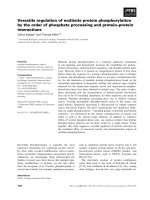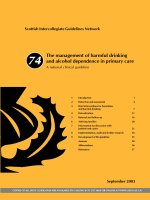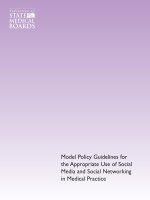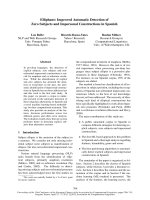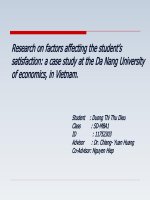Research factors affecting the organization of cost management accounting a case of the enterprises of mining, processing and trading constructions in the southern region
Bạn đang xem bản rút gọn của tài liệu. Xem và tải ngay bản đầy đủ của tài liệu tại đây (8.93 MB, 12 trang )
International Journal of Business and Management Review
Vol.5, No.3, pp.42-53, April 2017
Published by European Centre for Research Training and Development UK (www.eaiournals.orgl
RESEARCH FACTORS AFFECTING THE ORGANIZATION OF COST MANAGEMENT
ACCOUNTING: A CASE OF THE ENTERPRISES OF MINING, PROCESSING AND
TRADING CONSTRUCTIONS IN THE SOUTHERN REGION
Nguyen Thi Duc Loan
Ba Ria - Vung Tau University (BVU)
ABSTRACT: The primary role o f a management accounting officer in an organization is to
collect and provide appropriate and timely information to managers so that they can operate
and control the organization's operations and out decided. The enterprise managers often
plan and make decisions about production schedules and schedules, marketing managers
make decisions about advertising, promotion and pricing, and homes. Financial management
often makes decisions on capital mobilization and investment. All these managers need
information for their decisions. It is the management accounting staff that will provide useful
information to managers at all levels o f the organization. Therefore, a requirement for
management accounting staff is that they must be knowledgeable about decision-making
situations o f managers. Besides, the research results showed that there were 150 accounting
managers who interviewed and answered about 15 questions. The Data collected from
12/06/2016 to 15/12/2016 in the Southern region. The researcher had analyzed Cronbach’s
alpha, KMO test, the result o f KMO analysis usedfor multiple regression analysis. There are
three components following: Political - economic environment, information technology
system and human resource affecting the organization o f cost management accounting at the
enterprises o f mining, processing and trading constructions in the southern region with
significance level o f five percent. The research results were processed from SPSS 20.0
software. The parameters o f the model estimated by Least - Squares Method tested for the
model assumption with 5% significance level.
KEYWORDS: Accounting, cost management, management accounting and Ba Ria - Vung
Tau University (BVU)._________________________________________________________
INTRODUCTION
An organization can be defined as a group of people linked together to achieve a common
goal. A bank that carries out financial services is an organization, a university that carries out
training and education as an organization, and so on. An organization must be understood as
the people in the organization. Not the material wealth of the organization.
What does an organization have goals for? The answer is not simple. Yet, that is the basis for
making decisions about the strategy and strategy of the organization. The objectives of the
groups are diverse and varied. In each of the different stages of development, an organization
can determine one or several objectives. Here are some common goals of organizations: (1)
Maximize profit or achieve desired return; (2) Minimize costs; (3) Maximize market share or
achieve a certain level of market share; (4) Improve product quality, leading product quality;
(5) Maintain the existence of the business; (6) Growth; (7) Maximal value of the property; (8)
Achieve internal stability; (9) Responsibility for the environment and (10) provide high
quality services at minimal cost.
42
ISSN: 2052-6393(Print), ISSN: 2052-6407(Online)
International Journal of Business and Management Review
Vol.5, No.3, pp.42-53, April 2017
Published by European Centre for Research Training and Development UK (www.eaiournals.orgl
Cost and management accountant evaluates the efficiency of production as well as service
management and operational efficiency by collection, compilation, organization, verification
and analysis of information from various departments of an organization. However, in large
organizations the information is made available through the computer-based systems which
are especially designed for systemization of work. Moreover, the process encompasses
monitoring of related costs as well as overhead costs ����������������������������������������������������������������������������������������������������������������������������������������������������������������������������������������������������������������������������������������������������������������������������������������������������������������������������������������������������������������������������������������������������������������������������������������������������������������������������������������������������������������������������������������������������������������������������������������������������������������������������������������������������������������������������������������������������������������������������������������������������������������������������������������������������������������������������������������������������������������������������������������������������������������������������������������������������������������������������������������������������������������������������������������������������������������������������������������������������������������������������������������������������������������������������������������������������������������������������������������������������������������������������������������������������������������������������������������������������������������������������������������������������������������������������������������������������������������������������������������������������������������������������������������������������������������������������������������������������������������������������������������������������������������������������������������������������������������������������������������������������������������������������������������������������������������������������������������������������������������������������������������������������������������������������������������������������������������������������������������������������������������������������������������������������������������������������������������������������������������������������������������������������������������������������������������������������������������������������������������������������������������������������������������������������������������������������������������������������������������������������������������������������������������������������������������������������������������������������������������������������������������������������������������������������������������������������������������������������������������������������������������������������������������������������������������������������������������������������������������������������������������������������������������������������������������������������������������������������������������������������������������������������������������������������������������������������������������������������������������������������������������������������������������������������������������������������������������������������������������������������������������������������������������������������������������������������������������������������������������������������������������������������������������������������������������������������������������������������������������������������������������������������������������������������������������������������������������������������������������������������������������������������������������������������������������������������������������������������������������������������������������������������������������������������������������������������������������������������������������������������������������������������������������������������������������������������������������������������������������������������������������������������������������������������������������������������������������������������������������������������������������������������������������������������������������������������������������������������������������������������������������������������������������������������������������������������������������������������������������������������������������������������������������������������������������������������������������������������������������������������������������������������������������������������������������������������������������������������������������������������������������������������������������������������������������������������������������������������������������������������������������������������������������������������������������������������������������������������������������������������������������������������������������������������������������������������������������������������������������������������������������������������������������������������������������������������������������������������������������������������������������������������������������������������������������������������������������������������������������������������������������������������������������������������������������������������������������������������������������������������������������������������������������������������������������������������������������������������������������������������������������������������������������������������������������������������������������������������������������������������������������������������������������������������������������������������������������������������������������������������������������������������������������������������������������������������������������������������������������������������������������������������������������������������������������������������������������������������������������������������������������������������������������������������������������������������������������������������������������������������������������������������������������������������������������������������������������������������������������������������������������������������������������������������������������������������������������������������������������������������������������������������������������������������������������������������������������������������������������������������������������������������������������������������������������������������������������������������������������������������������������������������������������������������������������������������������������������������������������������������������������������������������������������������������������������������������������������������������������������������������������������������������������������������������������������������������������������������������������������������������������������������������������������������������������������������������������������������������������������������������������������������������������������������������������������������������������������������������������������������������������������������������������������������������������������������������������������������������������������������������������������������������������������������������������������������������������������������������������������������������������������������������������������������������������������������������������������������������������������������������������������������������������������������������������������������������������������������������������������������������������������������������������������������������������������������������������������������������������������������������������������������������������������������������������������������������������������������������������������������������������������������������������������������������������������������������������������������������������������������������������������������������������������������������������������������������������������������������������������������������������������������������������������������������������������������������������������������������������������������������������������������������������������������������������������������������������������������������������������������������������������������������������������������������������������������������������������������������������������������������������������������������������������������������������������������������������������������������������������������������������������������������������������������������������������������������������������������������������������������������������������������������������������������������������������������������������������������������������������������������������������������������������������������������������������������������������������������������������������������������������������������������������������������������������������������������������������������������������������������������������������������������������������������������������������������������������������������������������������������������������������������������������������������������������������������������������������������������������������������������������������������������������������������������������������������������������������������������������������������������������������������������������������������������������������������������������������������������������������������������������������������������������������������������������������������������������������������������������������������������������������������������������������������������������������������������������������������������������������������������������������������������������������������������������������������������������������������������������������������������������������������������������������������������������������������������������������������������������������������������������������������������������������������������������������������������������������������������������������������������������������������������������������������������������������������������������������������������������������������������������������������������������������������������������������������������������������������������������������������������������������������������������������������������������������������������������������������������������������������������������������������������������������������������������������������������������������������������������������������������������������������������������������������������������������������������������������������������������������������������������������������������������������������������������������������������������������������������������������������������������������������������������������������������������������������������������������������������������������������������������������������������������������������������������������������������������������������������������������������������������������������������������������������������������������������������������������������������������������������������������������������������������������������������������������������������������������������������������������������������������������������������������������������������������������������������������������������������������������������������������������������������������������������������������������������������������������������������������������������������������������������������������������������������������������������������������������������������������������������������������������������������������������������������������������������������������������������������������������������������������������������������������������������������������������������������������������������������������������������������������������������������������������������������������������������������������������������������������������������������������������������������������������������������������������������������������������������������������������������������������������������������������������������������������������������������������������������������������������������������������������������������������������������������������������������������������������������������������������������������������������������������������������������������������������������������������������������������������������������������������������������������������������������������������������������������������������������������������������������������������������������������������������������������������������������������������������������������������������������������������������������������������������������������������������������������������������������������������������������������������������������������������������������������������������������������������������������������������������������������������������������������������������������������������������������������������������������������������������������������������������������������������������������������������������������������������������������������������������������������������������������������������������������������������������������������������������������������������������������������������������������������������������������������������������������������������������������������������������������������������������������������������������������������������������������������������������������������������������������������������������������������������������������������������������������������������������������������������������������������������������������������������������������������������������������������������������������������������������������������������������������������������������������������������������������������������������������������������������������������������������������������������������������������������������������������������������������������������������������������������������������������������������������������������������������������������������������������������������������������������������������������������������������������������������������������������������������������������������������������������������������������������������������������������������������������������������������������������������������������������������������������������������������������������������������������������������������������������������������������������������������������������������������������������������������������������������������������������������������������������������������������������������������������������������������������������������������������������������������������������������������������������������������������������������������������������������������������������������������������������������������������������������������������������������������������������������������������������������������������������������������������������������������������������������������������������������������������������������������������������������������������������������������������������������������������������������������������������������������������������������������������������������������������������������������������������������������������������������������������������������������������������������������������������������������������������������������������������������������������������������������������������������������������������������������������������������������������������������������������������������������������������������������������������������������������������������������������������������������������������������������������������������������������������������������������������������������������������������������������������������������������������������������������������������������������������������������������������������������������������������������������������������������������������������������������������������������������������������������������������������������������������������������������������������������������������������������������������������������������������������������������������������������������������������������������������������������������������������������������������������������������������������������������������������������������������������������������������������������������������������������������������������������������������������������������������������������������������������������������������������������������������������������������������ources.
Table 4: KMO and Bartlett's Test for the organization of cost management accounting
KMO and Bartlett's Test
Kaiser-Meyer-Olkin Measure of Sampling Adequacy.
.649
67.409
Approx. Chi-Square
3
Bartlett's Test of Sphericity
df
.000
Sig.
Total Variance Explained
Com.
Initial Eigenvalues
Extraction Sums of Squared Loadings
Total
% of Variance Cumulative %
Total
% of Variance Cumulative %
1
1.814
60.464
60.464
1.814
60.464
60.464
2
.672
22.414
82.878
3
.514
17.122
100.000
Extraction Method: Principal Component Analysis.
Code
Component
1
GA2
.809
GA3
.799
GA1
.722
(Source: The researc ler’s collecting data and SPSS)
Table 4 showed that Kaiser-Meyer-Olkin measure of sampling adequacy was statistically
significant and high data reliability (KMO = 0.649 > 0.6). This result was very good for data
analysis. Table 3 showed that Cumulative percent was statistically significant and high data
reliability was 60.464 % (> 60 %). This Data is very good for the next analysis.
Regression analysis for factors affecting the organization of cost management accounting.
Table 4 showed that structure matrix for the organization of cost management accounting that
had 1 components following: Y: the organization of cost management accounting.
Table 5: Correlation test for factors affecting the organization of cost management
Y
X1
X2
X3
Pearson Correlation
Sig. (2-tailed)
N
Pearson Correlation
Sig. (2-tailed)
N
Pearson Correlation
Sig. (2-tailed)
N
Pearson Correlation
Sig. (2-tailed)
N
Y
1
147
.472**
.000
147
.530**
.000
147
.350**
.000
147
X1
.472**
.000
147
1
147
.106
.202
147
-.139
.094
147
X2
.530**
.000
147
.106
.202
147
1
147
.084
.310
147
X3
.350**
.000
147
-.139
.094
147
.084
.310
147
1
147
(Source: The researcher’s collecting data and SPSS)
49
ISSN: 2052-6393(Print), ISSN: 2052-6407(Online)
International Journal of Business and Management Review
Vol.5, No.3, pp.42-53, April 2017
Published by European Centre for Research Training and Development UK (www.eaiournals.orgl
Table 5 showed that there are correlations that are significant at the 0.01 level (2-tailed). The
correlation coefficient ranges from -1 to 1. A value of 1 implies that a linear equation
describes the relationship between X and Y perfectly, with all data points lying on a line for
which Y increases as X increases. A value of -1 implies that all data points lie on a line for
which Y decreases as X increases. A value of 0 implies that there is no linear correlation
between the variables. Table 5 showed that the correlation coefficient ranges from 0.3 to 0.6.
Table 6: Regression Model for factors affecting the organization of cost management
accounting
Model Summaryb
R
Adjusted Std. Error of DurbinWatson
Square R Square the Estimate
1
.771a
.594
.586
.33626
1.569
a. Predictors: (Constant), X3, X2, X1
b. Dependent Variable: Y
Bootstrap for Model Summary
DurbinModel
Bootstrap“1
Watson
Bias
Std.
95% Confidence
Error
Interval
Lower
Upper
1
1.569
-.450
.149
.845
1.431
a. Unless otherwise noted, bootstrap results are based on 3000
bootstrap samples
ANOVAa
Sum of
Mean
F
Model
df
Sig.
Squares
Square
Regression
23.683
3
7.894
69.816
.000b
16.169
143
.113
1
Residual
39.852
146
Total
a. Dependent Variable: Y
b. Predictors: (Constant), X3, X2, X1
Coefficients“1
Model
Unstandardized
Standardized
t
Sig.
Coefficients
Coefficients
B
Std.
Beta
Error
1.143
.153
7.467
.000
(Constant)
X1
.280
.032
.477
8.802
.000
X2
.226
.027
.448
8.312
.000
X3
.154
.022
.378
6.992
.000
Bootstrap for Coefficients
B
Model
Bootstrap“1
Bias
Std. Error
Sig. (2-tailed)
Model
R
1.143
.008
.139
.000
(Constant)
X1
.280
-.001
.031
.000
X2
.226
.000
.027
.000
X3
.154
-.001
.020
.000
a. Unless otherwise noted, bootstrap results are based on 3000 bootstrap samples
Collinearity Statistics
Tolerance
VIF
.967
.979
.971
1.034
1.022
1.030
95% Confidence Interval
Lower
Upper
.903
1.438
.219
.340
.173
.278
.114
.192
(Source: The researcher’s collecting data and SPSS)
50
ISSN: 2052-6393(Print), ISSN: 2052-6407(Online)
International Journal of Business and Management Review
Vol.5, No.3, pp.42-53, April 2017
Published by European Centre for Research Training and Development UK (www.eaiournals.orgl
Table 6 showed that adjusted R square was statistically significant and high data reliability. In
addition, adjusted R square reached 58.6 percent. The results showed that all t value > 2 was
statistically significant and high data reliability. Besides, the regression coefficients were
positive. This showed that the effects of independent variables in the same direction with the
organization of cost management accounting with significance level of 5 percent.
Multicollinearity (MC): Variance Inflation Factor (VIF) and tolerance are two measures that
can guide a researcher in identifying MC. Before developing the concepts, it should be noted
that the variance of the OLS estimator for a typical regression coefficient shown to be the
following VIF < 10 (1 < VIF < 10). This showed that there was not Multicollinearity. The
factors of X, X2 and X3 affecting the organization of cost management accounting with
significance level of 5 percent, especially; political - economic environment factor is the most
important of three factors. In addition, the bootstrap results are based on 3000 bootstrap
samples. The bias of the bootstrap results is very small, nearly 0.00.
CONCLUSIONS AND RECOMMENDATIONS
Conclusions
The enterprise owners are faced with countless decisions every business day. Managerial
accounting information provides data-driven input to these decisions, which can improve
decision-making over the long term. The enterprise managers can leverage this powerful tool
to help make their business more successful by understanding how management accounting
benefits common business decision contexts. In addition, this study results showed that there
were 150 accounting managers who interviewed and answered about 15 questions but 147
accounting managers processed. The Data collected from 12/06/2016 to 15/12/2016 in the
Southern region. The researcher had analyzed Cronbach’s alpha, KMO test, the result of
KMO analysis used for multiple regression analysis. Multiple regression results: there are
three components following: Political - economic environment, information technology
system and human resource affecting the organization of cost management accounting at the
enterprises of mining, processing and trading constructions in the Southern region with
significance level of five percent. The research results were processed from SPSS 20.0
software. The parameters of the model estimated by Least - Squares Method tested for the
model assumption with 5% significance level. This result is also a science evident for
managers at the enterprises of mining, processing and trading constructions in the Southern
region improving the policies for business in the future.
Recommendations
Recommendation for political - economic environment
Vietnam Government should continue economic stability-a macroeconomic goal is important
things: First of all, macroeconomic stability is a fundamental condition of the development of
society, especially the business and production activities. Secondly, political - macroeconomic
stability is an important function of the state in the management role to a market economy. In
economy market state will directly intervene in the management of production and business,
which make good function-oriented to the development of society (including strategy,
planning and plans) promotion developing and improving the system of institutions,
macroeconomic stability, good economic management of the state, to ensure the
implementation progress and social justice. Finally, the state of the current macroeconomic,
51
ISSN: 2052-6393(Print), ISSN: 2052-6407(Online)
International Journal of Business and Management Review
Vol.5, No.3, pp.42-53, April 2017
Published by European Centre for Research Training and Development UK (www.eaiournals.orgl
besides the positive results have emerged a number of limitations, shortcomings and facing
big challenges.
Recommendation for information technology system
The enterprises should continue investing the IT model that is synthesized in 4 successive
stages: (1) IT infrastructure investment; this stage refers to the initial investment of enterprises
in IT, including the basic hardware, software and human resources. (2l Enhance operational
and operational applications; the goal of this stage is to invest in IT to improve operational
performance, support for functional departments within the enterprise, specifically for the
operation of functional departments or task teams. (3) Comprehensive application to improve
management and production capacity; if stage 2 is the local digitization stage, phase 3 is the
digitalization phase of the whole enterprises, moving from the local to the whole is the biggest
issue of this phase. In terms of IT infrastructure, there should be a wide area network covering
enterprises, ensuring smooth flow of information among departments; Integrated software and
company-wide databases are key tools for management and operations; Implementing
synchronous solutions to help enterprises change the quality of internal management, improve
management capacity, increase efficiency and increase competitiveness. (4) Investment to
transform the business and create international competitive advantage. This is the IT
investment phase in order to gain competitive advantage in the modern business environment,
ie investing IT in products and services to create price advantage, make a difference, and
other products, in line with the competition strategy of the business. At each stage there are
specific objectives and follow the basic principles of IT investment: the investment must be in
line with the business objectives of the business; Investment must be effective; Invest in
enough people to use and promote investments in technology.
Recommendation for human resources
The enterprises should deploy solutions to human resource training for the advanced
accounting programs in short term and long term. At the same time, the enterprises need to
organize online training solutions, to promote their self-study, learning and self-improvement.
Through online human resources training of the advanced accounting programs, you can
understand what your employees are aiming for, and then develop their capabilities in the
right place, delivering 3-4 times more efficiency. Besides, the enterprises should cooperate
with organizations; universities, institutes, centers specializing in personnel training to help
staff can be trained professional. It helps employees improve their professional skills even
when they are working. It is necessary to periodically organize human resource training
courses, to be improved and developed according to human resources such as new and old
ones, senior managers and subordinate personnel, etc., so as to work out effective human
resource training solutions. Moreover, facilitating self-learning and self-development should
be one of the required policies. The provision of periodic skills materials via email, or the
organization of award-winning programs, is also a way for staff to self-motivate learning and
business in the enterprise.
Finally, the above-mentioned things, the next research should survey more than 150
accounting managers in other provinces of Vietnam. This helps the data that is more
significant. Because the study topic is very wide as the cost management accounting is a big
area.
52
ISSN: 2052-6393(Print), ISSN: 2052-6407(Online)
International Journal of Business and Management Review
Vol.5, No.3, pp.42-53, April 2017
Published by European Centre for Research Training and Development UK (www.eaiournals.orgl
REFERENCES
Burns, Quinn, Warren & Oliveira (2013). Management Accounting. McGraw-Hill, London.
Clinton, B.D.; Van der Merwe, Anton (2006). Management Accounting - Approaches,
Techniques, and Management Processes. Cost Management. New York: Thomas Reuters
RIA Group.
Chandler, Daniel; Munday, Rod (2012). Information technology. A Dictionary of Media and
Communication (first ed.), Oxford University Press.
Radhakrishna, A., and R. Satya Raju (2015). A Study on the effect of human resource
development on employment relations. IUP journal o f management research.
Dillman, D.A (2000). Mail and Internet Surveys. The Tailored Design Method, New York,
Wiley.
Dochartaigh, N. O. (2002). The Internet Research Handbook: A Practical Guide for
customers and Researchers in The Social Sciences. London, Sage.
Fink, A. (2003). How to Ask Survey Questions. Thousand Oaks, CA, Sage.
Peters, T.J. & Waterman (1982). In Search o f Excellence. New York: Harper & Row.
Saunders, M., Lewis, P. & Thornhill, A. (2007). Research Methods for Business Students.
United Kingdom: Prentice Hall.
Abdel-Kader, M., Luther, R. (2006). Management accounting practices in the British food and
drinks industry. British Food Journal.
Abo-Alazm Mohamed, F. (2013). Changes in the business environment and the level of
management accounting practices in Egypt: A case study. Journal o f American Science.
Albu, N., Albu, C. N. (2012). Factors Associated with the Adoption and Use of Management
Accounting Techniques in Developing Countries: The Case of Romania. Journal o f
International Financial Management & Accounting.
53
ISSN: 2052-6393(Print), ISSN: 2052-6407(Online)

